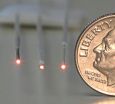How to raise a child who doesn't bully
New research shows involved parents are less likely to have children who harass others
2011-05-01
(Press-News.org) DENVER – With all of the media attention on young people being tormented by bullies and cyberbullies, parents may wonder what they can do to protect their children. The question they may want to ask instead is how can they prevent their child from becoming a bully.
New research to be presented on Sunday, May 1, at the Pediatric Academic Societies (PAS) annual meeting in Denver shows that parents can play a key role in decreasing the chances that their son or daughter will harass or intimidate other children.
Researchers, led by Rashmi Shetgiri, MD, FAAP, examined the prevalence of bullying reported by parents who took part in the National Survey of Children's Health from 2003-2007. They also looked at factors that were associated with an increased or decreased risk that a child bullied others.
The survey showed nearly one in six youths 10-17 years old bullied others frequently in 2007, according to Dr. Shetgiri, assistant professor of pediatrics at University of Texas Southwestern Medical Center and Children's Medical Center, Dallas. While the rates of parents who reported that their children harassed others frequently (defined as sometimes, usually or always) decreased from 2003 to 2007, these rates remain high, Dr. Shetgiri said.
Survey results also showed that 23 percent of children had bullied another youngster in 2003 compared to 35 percent in 2007.
Some factors that increase the likelihood that a child will bully others have persisted from 2003 to 2007. For example, children are more likely to be bullies if their parents frequently feel angry with them or feel their child bothers them a lot. In addition, children with an emotional, developmental or behavioral problem and those whose mothers report less than very good mental health also are more likely to be bullies. In fact, about one in five bullies has an emotional, developmental or behavioral problem, more than three times the rate in non-bullies, Dr. Shetgiri noted.
Other factors that seem to protect a child from becoming a bully also have persisted from 2003 to 2007. Parents who share ideas and talk with their child, and who have met most or all of their child's friends are less likely to have children who bully, Dr. Shetgiri said.
"Targeting interventions to decrease these persistent risk factors and increase the persistent protective factors could lead to decreased bullying," she said.
For example, parents can increase involvement with their children by meeting their friends and by spending time talking and sharing ideas with their children, Dr. Shetgiri suggested. "They also can find effective ways to manage any feelings of anger toward their child and can work with health care providers to make sure any emotional or behavioral concerns they have about their child, as well as their own mental health, are addressed."
###
To view the abstract, go to http://www.abstracts2view.com/pas/view.php?nu=PAS11L1_965.
The Pediatric Academic Societies (PAS) are four individual pediatric organizations who co-sponsor the PAS Annual Meeting – the American Pediatric Society, the Society for Pediatric Research, the Academic Pediatric Association, and the American Academy of Pediatrics. Members of these organizations are pediatricians and other health care providers who are practicing in the research, academic and clinical arenas. The four sponsoring organizations are leaders in the advancement of pediatric research and child advocacy within pediatrics, and all share a common mission of fostering the health and well being of children worldwide. For more information, visit www.pas-meeting.org. Follow news of the PAS meeting on Twitter at http://twitter.com/PedAcadSoc.
END
ELSE PRESS RELEASES FROM THIS DATE:
2011-05-01
DENVER – Extremely premature infants who screen positive for autism spectrum disorder (ASD) at 18 months of age may not actually have autism. Rather, they may fail screening tests due to an unrelated cognitive or language delay, according to research to be presented Sunday, May 1, at the Pediatric Academic Societies (PAS) annual meeting in Denver.
An estimated one in 110 U.S. children has ASD, a group of complex developmental brain disorders that affect behavior, social skills and communication. The American Academy of Pediatrics (AAP) recommends that pediatricians screen ...
2011-05-01
VIDEO:
Exposure to secondhand smoke, even at extremely low levels, is associated with increased blood pressure in boys, according to new research being presented Sunday, May 1, at the Pediatric Academic...
Click here for more information.
DENVER – Exposure to secondhand smoke, even at extremely low levels, is associated with increased blood pressure in boys, according to new research being presented Sunday, May 1, at the Pediatric Academic Societies (PAS) annual meeting in ...
2011-05-01
Exposure to the chemical bisphenol A during early pregnancy may be associated with wheezing in children, according to a Penn State College of Medicine researcher.
Bisphenol A, or BPA is a chemical found in many consumer products, including plastic water bottles and food containers. It is present in more than 90 percent of the U.S. population, suggesting widespread exposure. Experimental research suggests that prenatal BPA exposure causes asthma in mice, but no data exists for humans.
Adam Spanier, M.D., Ph.D., assistant professor of pediatrics, studied 367 children, ...
2011-05-01
It can be quite jarring for a parent or caregiver to look in the rearview mirror while driving and see their child roaming around the backseat free of their safety restraints. A study on child self-unbuckling by Yale School of Medicine researchers reveals that most children who first unbuckle were age three and under and that many children unbuckle while the vehicle is in motion—putting them at a 3.5-fold increased risk for serious injuries.
"We found that young children might acquire the motor skills to unbuckle from restraints before developing the cognitive ability ...
2011-05-01
If you have knowledge of fraud against the government, you can become a whistleblower and file a qui tam lawsuit. Under the False Claims Act, whistleblowers can file claims on behalf of the government to recover lost money from the fraudulent actions of the defendant. These are very complex claims and require the assistance of an experienced qui tam attorney.
Where and When to File your Qui Tam Lawsuit
The False Claims Act is a federal law, and as a result, your case can generally be filed in a federal court. However, some states have also enacted their own False ...
2011-05-01
Nurses who care for patients with dementia now have a tailored approach to dental hygiene for their charges, thanks to a pilot study by a team of nurses.
"Poor oral health can lead to pneumonia and cardiovascular disease as well as periodontal disease," said Rita A. Jablonski, even though these illnesses are not usually associated with the mouth. According to Jablonski, assistant professor of nursing, Penn State, persons with dementia resist care when they feel threatened. In general, these patients cannot care for themselves and need help.
Jablonski and her team introduced ...
2011-05-01
Science is finally confirming what grandma knew all along: infants wake up taller right after they sleep.
Findings from the first study of its kind measuring the link between daily growth and sleep show the two are inextricably linked. Specifically, growth spurts are tied to an increase in total daily hours of sleep as well as an increase in the number of daily sleep bouts, the time from the onset of sleep until awakening.
"Little is known about the biology of growth spurts," says Michelle Lampl, MD, PhD, Samuel C. Dobbs professor of anthropology, Emory University, ...
2011-05-01
Denver, Colo. (May 1, 2011) -- A drug commonly used to treat kidney cancer may increase the effectiveness of chemotherapy for mesothelioma, according to a study published in the May issue of the Journal of Thoracic Oncology.
Temsirolimus, a kinase inhibitor, blocks the action of mammalian target of rapamycin (mTOR), a protein that regulates cell growth, which can slow tumor growth. It's used to treat advanced renal cell carcinoma.
But researchers in Austria have found that temsirolimus also may slow the growth of malignant pleural mesothelioma cells. Mesothelioma, a ...
2011-05-01
A new kind of sensor could warn emergency workers when carbon filters in the respirators they wear to avoid inhaling toxic fumes have become dangerously saturated.
In a recent issue of the journal Advanced Materials, a team of researchers from the University of California, San Diego and Tyco Electronics describe how they made the carbon nanostructures and demonstrate their potential use as microsensors for volatile organic compounds.
First responders protect themselves from such vapors, whose composition is often unknown, by breathing through a canister filled with ...
2011-05-01
There has been numerous requests from Hawaii residents for a kama'aina discount for the "Invitation To Foodies" culinary seminar at the Makena Beach and Golf Resort on Maui. This seminar benefits three Maui non-profits. The non-profits are the Friends of the Children's Justice Center of Maui, Haku Baldwin Center and Ka Lima O Maui.
As sponsors of the event, TasteHawaiiOnline.com had to first consider how a discount would affect the quality of the seminar, the lecturers, the presentations and the food.
Local chef personalities are asked to share their knowledge ...
LAST 30 PRESS RELEASES:
[Press-News.org] How to raise a child who doesn't bully
New research shows involved parents are less likely to have children who harass others

